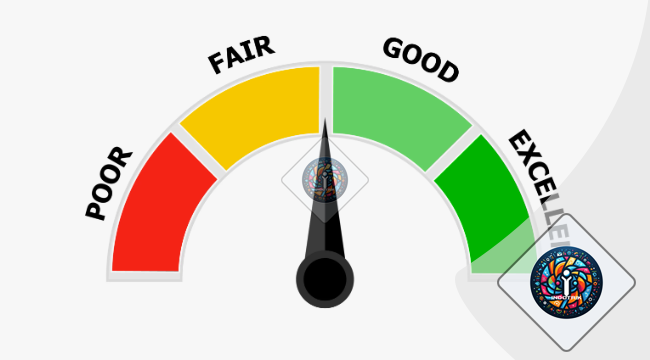
Picture this: You’re checking your credit score, and there it is—660. It’s not bad, but it’s not great either. You’re right on the edge, and that can feel like a frustrating place to be. But what does this number really mean? Is it holding you back, or can it still open doors to financial opportunities?
A 660 credit score is a lot like being in the middle of a marathon: you’ve come a long way, but there’s still some work to do before you reach the finish line. Let’s break down what having a 660 credit score means, how it affects your financial life, and the actionable steps you can take to boost it.
What Exactly Is a 660 Credit Score?
A 660 credit score falls into the “Fair” category, according to most scoring models like FICO and VantageScore. Here’s a quick breakdown of the typical credit score ranges:
- Poor: 300-579
- Fair: 580-669
- Good: 670-739
- Very Good: 740-799
- Excellent: 800-850
Being at 660 places you toward the higher end of the “Fair” range, which is better than it sounds. It means lenders see you as a moderate risk—not perfect, but certainly not a red flag. With this score, you can still access credit, though it may come with higher interest rates or stricter terms.
Why Your 660 Credit Score Matters
1. Loan Approvals Are Possible, but Terms May Be Limited
With a 660 score, you’re likely to get approved for personal loans, car loans, or credit cards, but you might not qualify for the best interest rates. Think of it as getting access to the VIP lounge but being seated near the exit.
2. Credit Card Options Are Narrower
Premium credit cards with top-tier perks might be out of reach for now, but you can still qualify for decent rewards cards or credit-building options.
3. Mortgage Opportunities May Be Limited
Home loans are an option, but lenders may require larger down payments or charge higher interest rates.
4. Insurance Rates Could Be Higher
Some insurance companies consider your credit score when calculating premiums, and a score in the 660 range might lead to slightly higher costs.
How to Make the Most of Your 660 Credit Score
Here’s the good news: A 660 score is a solid starting point. With a few strategic moves, you can improve your score and unlock better opportunities.
1. Focus on Payment History
Since payment history makes up about 35% of your credit score, consistently paying bills on time is the fastest way to see improvement. Late payments can linger on your report for years, so prioritize this above all else.
2. Reduce Your Credit Utilization
Your credit utilization rate—the amount of available credit you’re using—plays a big role in your score. Aim to keep your balances below 30% of your total credit limit.
3. Avoid Hard Inquiries
Each time you apply for credit, it triggers a hard inquiry, which can temporarily lower your score. Be selective about applying for new credit accounts.
4. Diversify Your Credit Mix
Having different types of credit—like a credit card and an auto loan—can improve your score. It shows lenders that you can handle various forms of debt responsibly.
5. Dispute Errors on Your Credit Report
Mistakes happen. Regularly check your credit report for inaccuracies, such as accounts you don’t recognize or incorrect late payments. Fixing these errors can quickly bump up your score.
What Can You Achieve with a 660 Credit Score?
While a 660 score isn’t ideal, it’s far from a deal-breaker. Here are a few financial moves you can make right now:
1. Apply for a Secured Credit Card
Secured credit cards are designed for people looking to build or rebuild their credit. They require a deposit upfront, but they report your payments to the credit bureaus, helping you improve your score over time.
2. Consider Refinancing High-Interest Loans
If you have existing debt with a higher interest rate, look into refinancing options. Even a modest improvement in terms can save you money in the long run.
3. Build an Emergency Fund
Having an emergency fund not only protects you financially but also ensures you’re not relying on credit for unexpected expenses.
4. Leverage Alternative Credit Data
Some lenders now consider alternative data, like rent or utility payment history, when evaluating creditworthiness. Adding this information can improve your chances of approval.
The Emotional Side of Credit Scores
Let’s face it—seeing a 660 credit score can feel like you’re stuck in limbo. But it’s important to remember that your credit score is just a tool. It doesn’t define your financial future; it merely reflects where you are right now.
When I first saw my own score hovering around this range, I felt a mix of frustration and determination. It wasn’t where I wanted to be, but it was a wake-up call to take control of my finances.
Common Myths About a 660 Credit Score
1. “You Can’t Get a Loan”
False. While terms may not be ideal, you can still get approved for loans and credit cards with a 660 score.
2. “Checking Your Credit Hurts Your Score”
Not true. Soft inquiries, like checking your own score, don’t affect it. Hard inquiries, however, do.
3. “Closing Old Accounts Helps Your Score”
Actually, closing old accounts can shorten your credit history and reduce your available credit, both of which can negatively impact your score.
Real-Life Success Stories
A friend of mine, Alex, had a 660 credit score when they decided to buy their first car. While the interest rate wasn’t as low as they’d hoped, it was a stepping stone. By making on-time payments, Alex boosted their score to 720 within a year, which opened up better financial opportunities.
Closing: Your 660 Credit Score Is Just the Beginning
So, what does a 660 credit score mean? It means potential. It’s a sign that you’ve got the basics down but still have room to grow.
Use this as an opportunity to fine-tune your financial habits, whether it’s paying bills on time, lowering debt, or simply understanding how credit works. With time and effort, you can move from “Fair” to “Good” and even “Excellent.”
Your credit journey is just that—a journey. Take it one step at a time, and remember: Every small change adds up to big progress. Now go out there and make your 660 work for you!





